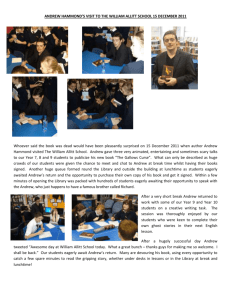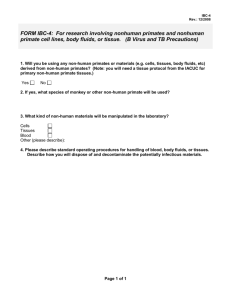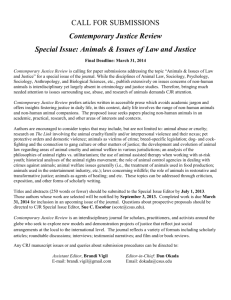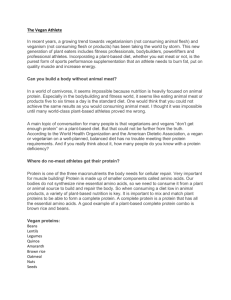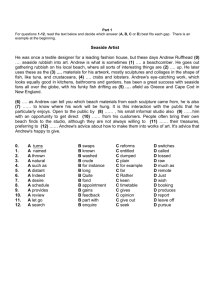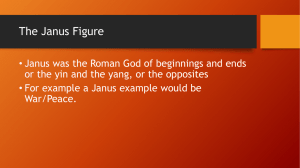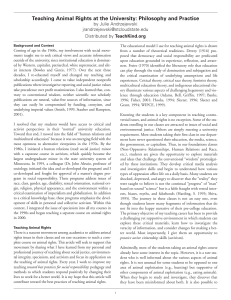here - The Vegan Society
advertisement
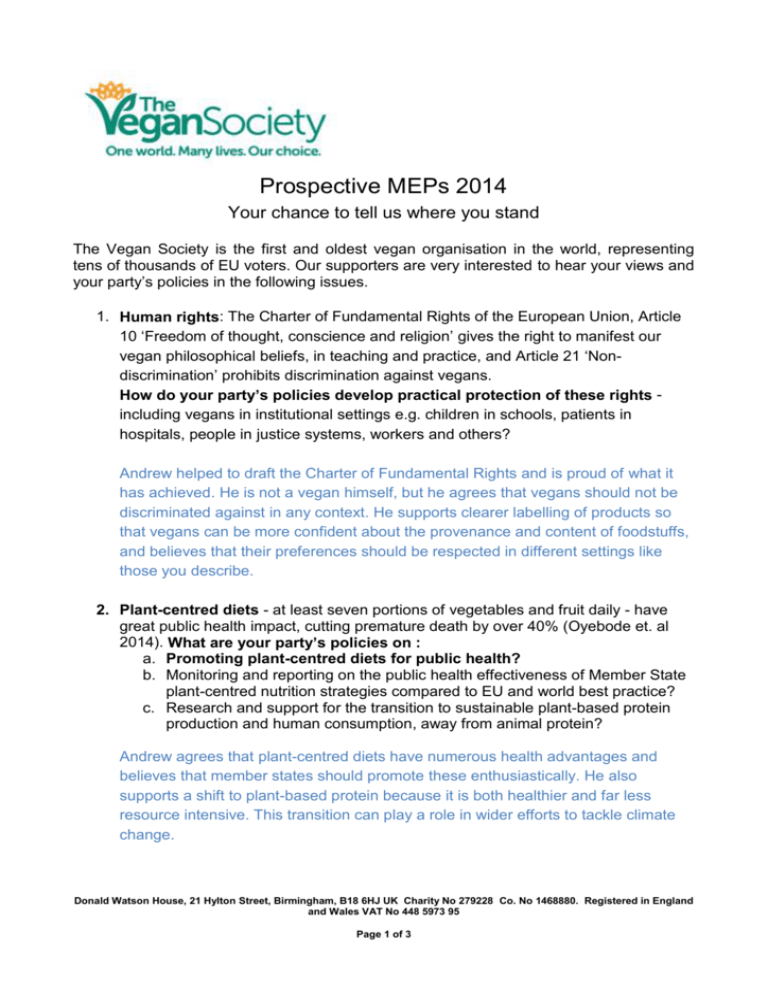
Prospective MEPs 2014 Your chance to tell us where you stand The Vegan Society is the first and oldest vegan organisation in the world, representing tens of thousands of EU voters. Our supporters are very interested to hear your views and your party’s policies in the following issues. 1. Human rights: The Charter of Fundamental Rights of the European Union, Article 10 ‘Freedom of thought, conscience and religion’ gives the right to manifest our vegan philosophical beliefs, in teaching and practice, and Article 21 ‘Nondiscrimination’ prohibits discrimination against vegans. How do your party’s policies develop practical protection of these rights including vegans in institutional settings e.g. children in schools, patients in hospitals, people in justice systems, workers and others? Andrew helped to draft the Charter of Fundamental Rights and is proud of what it has achieved. He is not a vegan himself, but he agrees that vegans should not be discriminated against in any context. He supports clearer labelling of products so that vegans can be more confident about the provenance and content of foodstuffs, and believes that their preferences should be respected in different settings like those you describe. 2. Plant-centred diets - at least seven portions of vegetables and fruit daily - have great public health impact, cutting premature death by over 40% (Oyebode et. al 2014). What are your party’s policies on : a. Promoting plant-centred diets for public health? b. Monitoring and reporting on the public health effectiveness of Member State plant-centred nutrition strategies compared to EU and world best practice? c. Research and support for the transition to sustainable plant-based protein production and human consumption, away from animal protein? Andrew agrees that plant-centred diets have numerous health advantages and believes that member states should promote these enthusiastically. He also supports a shift to plant-based protein because it is both healthier and far less resource intensive. This transition can play a role in wider efforts to tackle climate change. Donald Watson House, 21 Hylton Street, Birmingham, B18 6HJ UK Charity No 279228 Co. No 1468880. Registered in England and Wales VAT No 448 5973 95 Page 1 of 3 3. Climate change and Stock-free farming Moving away from animal farming - to food, fuel and other crops for direct human use – can significantly cut EU greenhouse gas emissions. What are your party’s policies on supporting EU farmers who wish to move toward horticulture, arable farming, agro-forestry and other crop farming, away from the ‘livestock’ industry? Andrew is supportive. This is something that should be taken into account in the development of the next round of the Common Agricultural Policy. Andrew and the Lib Dems pressed for the last round to strengthen the green elements of the CAP, but in the end the Conservatives and their colleagues voted for a much less ambitious package. 4. Food security: What are your party’s policies on reaping the potential of accessible and nutritious plant-based food to ensure food security for European and global citizens? Food security is one of the key challenges for EU member states and not one that has received sufficient attention. Andrew believes that it needs to have a much higher profile in the life of the next parliament and will seek to play his part in achieving this. Plant-based food obviously has significant health and ecological benefits and should be given proper consideration as part of any food security strategy. 5. Non-human animals in testing, science and education Research on non-human animals frequently fails to predict the actual effects on humans. What are your party’s policies to improve the quality of testing, science and education by replacing the use of non-human animals with the wide range of proven effective alternatives? Andrew believes that where effective alternatives exist they should be used, and that animals should only ever be used for testing for medically significant products where no known alternative exists. For instance, he supported the recent ban on the testing of cosmetic products on animals. 6. Non-human animals in entertainment Animals suffer needlessly even in so-called ‘good’ zoos, circuses, race-tracks and other entertainment venues. What are your party’s policies to end the use of non-human animals in entertainment? Andrew does not support the use of wild animals in entertainment industries. He is not opposed in principle to the existence of zoos and circuses on the condition that the animals’ welfare standards are the highest order. Unfortunately this is not always the case, and member states must do more to monitor these industries. 7. Common Agricultural Policy a. How can Pillar 1 Basic Payments be used to reward environmentally sustainable practices which also benefit non-human animals? b. How can Pillar 1 Green Direct Payments be used to support farmers who wish to move away from unsustainable ‘livestock’ farming? Donald Watson House, 21 Hylton Street, Birmingham, B18 6HJ UK Charity No 279228 Co. No 1468880. Registered in England and Wales VAT No 448 5973 95 Page 2 of 3 c. How can Pillar 1 Payments be used to move away from imported nonEU animal feed, to significantly reduce GHG emissions? d. Pillars 1 & 2 An estimated over €129.6 million in EU subsidies has been used to support bull cattle ‘fiestas’ and the ‘Toros’ industry in Spain (http://www.greens-efa.eu/fileadmin/dam/Documents/Studies/20135%20Bullfighting%20subsidies%20report.pdf). What steps will your party take to end this support? e. Pillar 2: Rural Development. For each such programme, 30% of the budget is reserved for voluntary measures beneficial to the environment. How can Pillar 2 Rural Development Payments be used to help farmers who wish to move away from the ‘livestock’ industry? Please find attached the Liberal Group’s report on the Common Agricultural Policy, which sets out our broad position on the reforms that we would like to see. 8. What are your party’s policies on neonicotinoids and restoring EU bee populations? Andrew voted for the ban on neonicotinoid insecticides and recently was the only MEP in the East of England to vote against relaxing this ban, a proposal that was brought forward by a British Conservative MEP. More widely, Andrew knows that pesticides are only one factor in the decline of our bee population and other pollinators, and a wide range of changes are needed if we are to tackle this threat head on. Pollinators are lynchpins of our ecology and we ignore their decline at our peril. 9. Common Fisheries Policy: What are your party’s policies on protecting both endangered and other fish in European waters? The Liberal Group in the European Parliament led the “Fish Fight” campaign to stop the overfishing of our waters and to replenish stocks to sustainable levels. 10. If elected as an MEP for 2014-2019, which key policy issues do you intend to address related to: a. Reducing the use of non-human animals for human purposes? b. Increasing environmental sustainable plant agriculture? c. Using crop farming to increase global human food security? Andrew does not believe that it is possible to single out one such issue in each case. These issues will come up again and again and he will try to vote in a way that is liberal, compassionate, evidence-based and ecological sustainable. Thank you for taking the time to share your views and your party’s policies with our supporters. Finally, if you’d like to share, would you describe yourself as: 1. Vegan 2. Other, please describe: Donald Watson House, 21 Hylton Street, Birmingham, B18 6HJ UK Charity No 279228 Co. No 1468880. Registered in England and Wales VAT No 448 5973 95 Page 3 of 3


